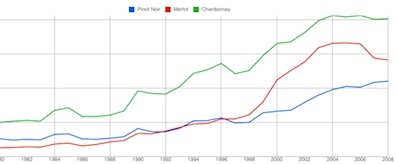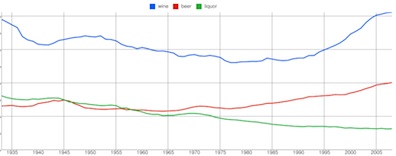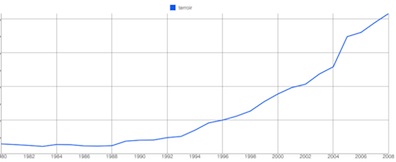The Frequency of Usage of Wine Words
The tagline for this blog has, from its beginning, been: "A Blog Set Inside The World of Wine Public Relations—Where The Media, The Culture And I Mingle"
It's that "culture" part that has always really had my interest. So, I was fascinated to find Google Ngrams, a beta program that allows the user to search the frequency of use of words, over time, in more than 5.2 million books that Google has scanned. These books reach back to before 1800.
Google Ngrams is not perfect and it is limited. One can focus their search for words based on a particular time frame and based on a corpus of books (those in American English, British English, a combination, French, etc). However, one can not focus on searching just history books, just scientific books, just romance novels, etc. And, again, we are only talking books, not periodicals.
I immediately began searching on and comparing the use of wine related terms. I immediately found the results fascinating. However, the question arises, what can we learn from comparing, for example, the use of the terms "Merlot", "Chardonnay", and "Pinot Noir" in books published between 1990 and 2008?
The use of all three terms has been on the rise since 1980. However, "Chardonnay" usage has leveled off since 2004, "Merlot" is trending down since 2004. Yet "Pinot Noir" usage continues to rise. The Sideways Effect shown in word usage?
What if we compare the words "wine", "beer" and "liquor" (using the term "spirits" would deliver something different since it has various meanings) and their use in American English since 1933.
In this case we see that the use of the word "wine" has been on a steady increase since 1985 after trending downward for many years, as has the use of the term "beer", but it's increase in use is not as dramatic. Meanwhile, the term "liquor" remains on a steady downward trend.
Want to see something interesting? Look at the usage of the term "terroir" in books in written in American English from 1980 to 2008.
Interpreting the information derived from Google Ngrams can be problematic as is pointed out in this fascinating article. However, it appears that cultural anthropologists and other are very excited about this new tool, particularly as it is improved. I would count myself as one who is excited about such things. The History Student in me gets very excited about such things.
Play with the Google Ngrams, but do so with caution.




I liked the post’s selection of wine vocabulary words as a meaningful sample of modern trends in the trade. I think R.A. Mondavi would have enjoyed the exercise, as well, given his early impetus to the past 30 years’ modernizations in the wine industry.
Besides the critiques offered by the linked article, I would add a caveat based upon the entire matter of what the Google book library contains, as there have been numerous legal and professional challenges to the structure of Google’s library. The way I understand it, Google often works on a formal contract basis; for example, with a famous library whose management supports archiving that library’s entire collection of volumes.
I did a couple posts about Ngrams last year. Another key limitation is that the search is case sensitive, which tripped me up on Bourbon vs bourbon. Trying Wine vs wine is kind of interesting too.
http://www.elbloggotorcido.com/2010/12/i-cant-take-your-case-its-too-sensitive.html
I looked up “wark” and it is definitely trending upward.
can you send me your mailing address we have a wine aerator we would like to send you to review. thanks.
Confusing but I assume this will be good support and very helpful topic for everyone.